Lemon may help soothe a sore throat due to its astringent properties and ability to break up mucus. Staying hydrated and avoiding irritants are important for sore throat relief. If symptoms persist or are severe, consulting a doctor is recommended.
Lemon is a common household ingredient often touted for its health benefits, including its use in the treatment of sore throats. Its widespread recognition as a home remedy stems from its properties as a natural astringent, its ability to help break up mucus, and its soothing effect on irritated throat tissues. Many individuals find the combination of warm water with lemon and honey a comforting way to alleviate the discomfort associated with a sore throat.

While lemon can help ease the pain related to a sore throat, understanding the underlying causes of this ailment is crucial for effective treatment. Sore throats are commonly caused by viral infections and, less frequently, by bacterial infections. As such, treatments vary depending on the cause and severity of the symptoms. Besides lemon, there are various alternative remedies and dietary considerations that may aid in recovery, such as staying hydrated, using steam therapy, and avoiding irritants like spicy foods when experiencing throat pain.
Why Do People Get Sore Throats?

A sore throat can arise from various causes, primarily due to viral infections such as the common cold, but also through bacterial infections like strep throat, or from environmental factors.
Viral Infection and Sore Throats
- Common Cold: The primary culprit for a sore throat is often the common cold, which is caused by rhinoviruses.
- Flu Season: Influenza viruses, more active during flu season, can also lead to throat irritation and pain.
Viruses that cause the common cold and flu are airborne and spread through respiratory droplets. When someone with the virus coughs or sneezes, the virus can be inhaled by others, leading to an infection that often includes a sore throat.
Bacterial Infections and Strep Throat
- Strep Throat: Caused specifically by the Streptococcus pyogenes bacteria.
- Symptoms: Strep throat is characterized by severe pain, redness, and swelling in the throat.
Bacterial infections are less common but typically more severe than viral ones. Strep throat, distinct from viral sore throats, may require antibiotics for treatment.
Other Factors Contributing to Throat Pain
Other contributors to throat pain can include:
- Environmental Irritants:
- Smoke
- Pollution
- Dry air
- Allergies:
- Pollen
- Dander
- Strain:
- Overuse (shouting, singing)
- Gastroesophageal reflux disease (GERD)
These factors can irritate the mucous membranes of the throat, leading to discomfort and soreness.
Is Lemon Beneficial for Sore Throats?
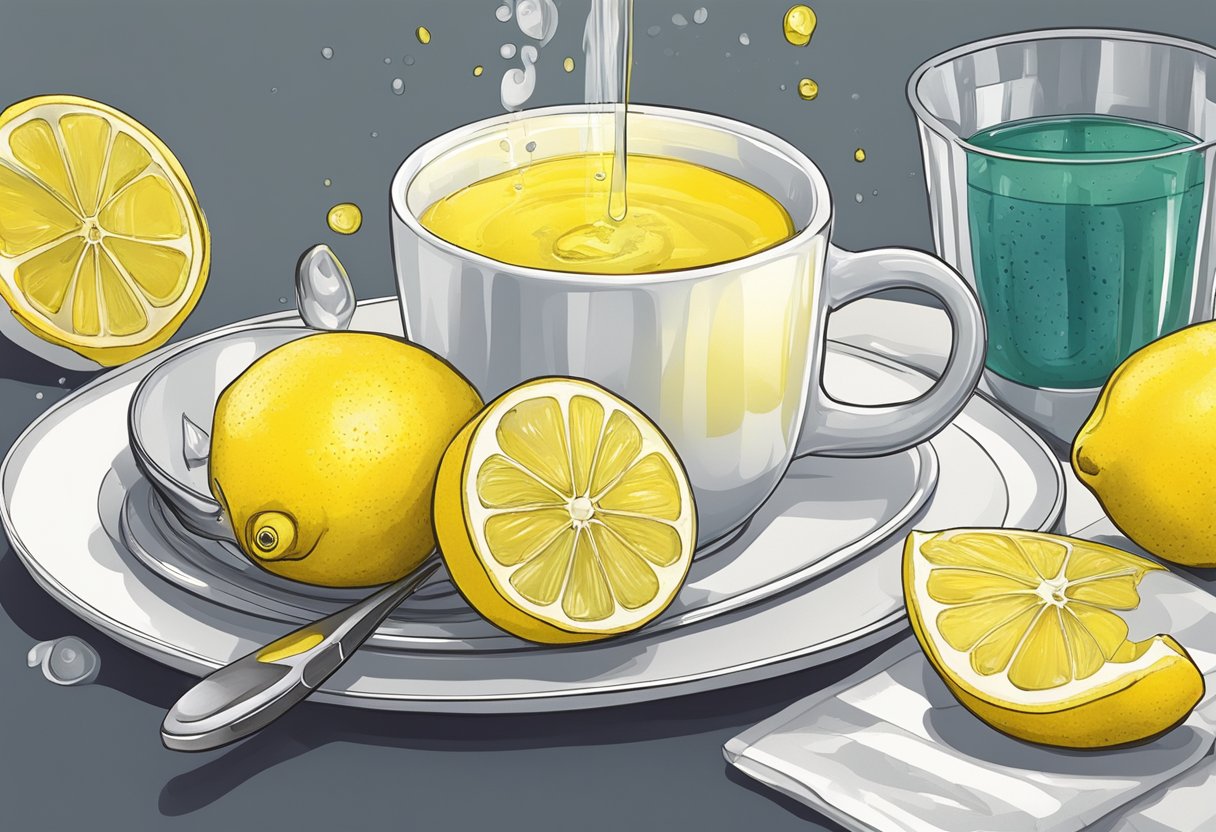
Incorporating lemon into remedies for a sore throat can be advantageous due to its content of vitamin C, its natural antibacterial properties, and the soothing effect it can have on the throat’s mucous membranes.
How Does Vitamin C in Lemons Support the Immune System?
Vitamin C is essential for the immune system’s function. Lemons are high in vitamin C, which contributes to immune defense by supporting various cellular functions of both the innate and adaptive immune system.
- Role of Vitamin C:
- Enhances immune cell function
- Acts as an antioxidant
- Supports the skin’s barrier against pathogens
- Reduces the duration of the common cold
| Nutrient in Lemons | Immune System Function |
|---|---|
| Vitamin C | Supports immune system cells |
Can Citric Acid in Lemon Juice Act as an Antibacterial?
Citric acid possesses natural antibacterial properties. It is one of the active components found in lemon juice that can help combat infections.
- Actions of Citric Acid:
- Disrupts the growth of bacteria
- Aids in throat infection prevention
Is Lemon Juice a Natural Lubricant for the Throat?
Yes, lemon juice can help lubricate the throat. The juice can coat the throat and provide temporary relief from soreness and irritation.
- Soothing Effects:
- Coating the throat
- Easing discomfort with its mild acidity
Alternative Remedies for Sore Throat

When dealing with a sore throat, many individuals turn to alternative remedies that can be both soothing and effective in alleviating discomfort. These remedies range from herbal teas that provide symptomatic relief to salt water gargles that can reduce pain and inflammation.
What Herbal Teas and Their Benefits Can Offer for a Sore Throat?
Herbal teas are known for their soothing properties and can be quite beneficial in the treatment of sore throats. Here are some commonly used teas and their specific benefits:
- Chamomile tea: Offers anti-inflammatory, antioxidant, and astringent properties.
- Peppermint tea: Contains menthol, which acts as a natural decongestant, helping to break down mucus.
- Raspberry tea: Recognized for its antioxidants and can assist in reducing inflammation.
- Clove tea: Provides a numbing effect due to the eugenol it contains, which can alleviate throat pain.
How Does Salt Water Gargle to Reduce Pain Work for Sore Throats?
Gargling with salt water can reduce sore throat pain and swelling as it helps to cleanse the throat and draw out excess fluid from inflamed tissues.
- Procedure:
- Dissolve 1/2 teaspoon of salt in a cup of warm water.
- Gargle for a few seconds and spit out. Repeat several times a day as needed.
How Effective Are Throat Lozenges for Sore Throat Relief?
Throat lozenges can be effective for temporary sore throat relief. They work by:
- Mechanism of action:
- Lozenges stimulate saliva production, which keeps the throat moist and can help soothe irritation.
- Some lozenges contain analgesic ingredients that can reduce throat pain.
| Type of Lozenge | Ingredient | Purpose |
|---|---|---|
| Herbal Lozenge | Eucalyptus, peppermint | Clears nasal passage, soothes throat |
| Anaesthetic Lozenge | Benzocaine | Numbs the throat to relieve pain |
Using these alternative remedies can provide significant relief from sore throat symptoms. They are a natural approach and can be used alongside or sometimes in place of more conventional medical treatments.
Is Hydration Crucial for Sore Throat Relief?

Yes, staying hydrated is crucial for alleviating a sore throat. Proper hydration helps maintain the necessary moisture in the throat, which can soothe irritation and reduce discomfort.
Importance of Drinking Plenty of Fluids
- Staying Hydrated: To relieve a sore throat, one should drink plenty of fluids. This helps to prevent the throat from becoming dry, which can exacerbate soreness.
- Types of fluids to consider:
- Water
- Herbal teas
- Broths
- Types of fluids to consider:
| Fluid Type | Benefits for Sore Throat |
|---|---|
| Water | Keeps throat moist and prevents dehydration |
| Herbal Tea | Warmth soothes throat, and herbs may have anti-inflammatory properties |
| Broth | Provides warmth and hydration, and can be soothing |
- Avoiding Certain Drinks: Some beverages, such as those containing caffeine or alcohol, can contribute to dehydration. It is important to minimize intake of these when experiencing a sore throat.
Warm Water for Throat Moisture
Using Warm Water: A glass of warm water can provide immediate relief for a sore throat. The warmth helps to keep the throat moist and can reduce the discomfort caused by dry air.
- Ways to use warm water:
- Simply sipping warm water throughout the day
- Gargling with salt water to reduce swelling and discomfort
- Ways to use warm water:
| Method | Description |
|---|---|
| Sipping Warm Water | Regular sipping helps to steadily soothe the throat |
| Gargling Salt in Water | Antiseptic effect and may alleviate throat pain |
- Maintaining Moisture in Dry Air: Especially in dry environments, one should consider using a humidifier to add moisture to the air. This can help keep the throat moist overnight and prevent waking up with increased soreness.
Dietary Considerations and Sore Throat
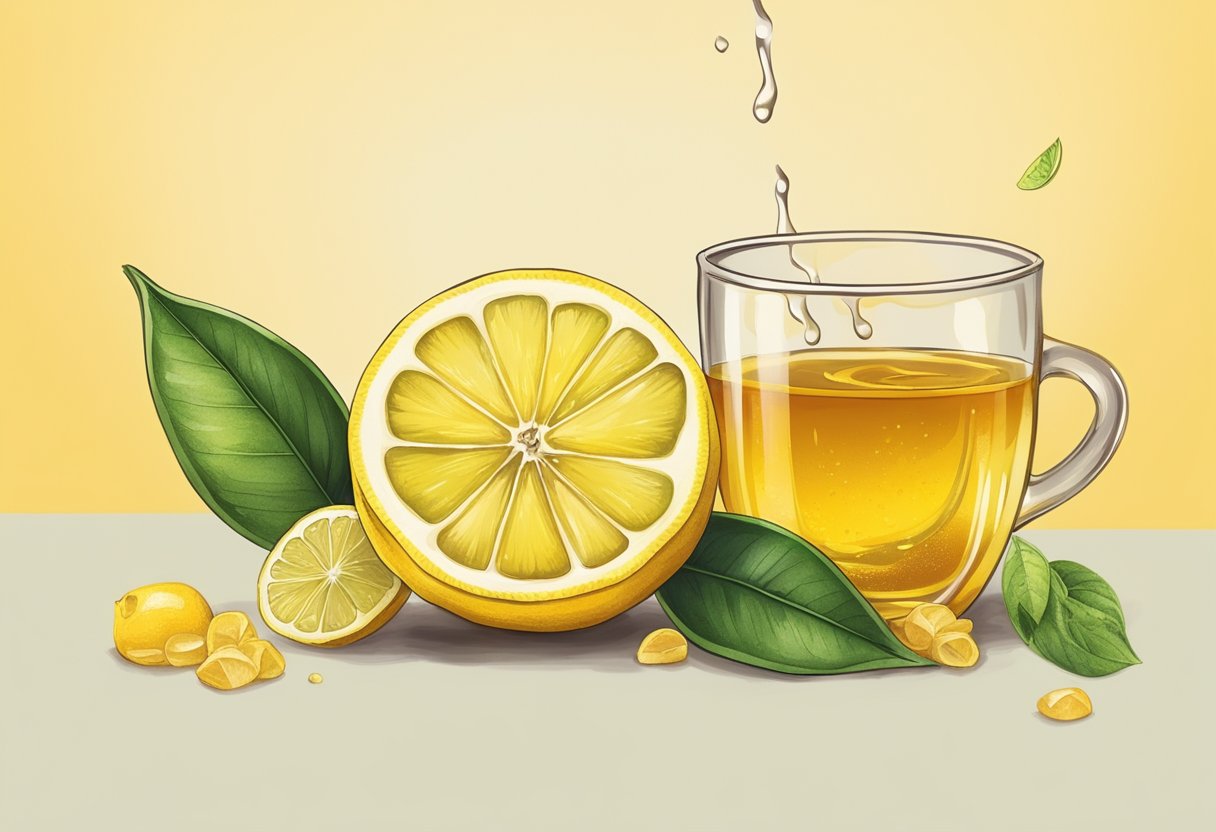
Diet affects the severity and recovery time from a sore throat. Specific foods can aggravate the condition, while others may provide comfort and hasten healing. It’s important for individuals to know which dietary choices can help soothe a sore throat and which should be avoided.
Foods to Avoid During a Sore Throat
Avoiding certain foods can help reduce irritation and discomfort associated with a sore throat. These foods generally have qualities that can exacerbate inflammation or irritate the mucous membranes.
- Acidic Foods: Their acidic nature can lead to discomfort.
- Citrus fruits (other than lemon)
- Tomato products
- Spicy Foods: May cause further irritation to the throat.
- Crunchy Snacks: Hard edges can scratch the sore throat.
- Very Hot Beverages: Can worsen inflammation.
Beneficial Foods for a Soothing Effect
Some foods are known for their soothing properties and can help ease the pain of a sore throat. These foods often have an anti-inflammatory effect and provide much-needed relief.
- Lemon: The acidity of lemon can help break up mucus, though moderation is important as too much acidity can be irritating. Combine with water to dilute.
- Honey: Known for its soothing and anti-inflammatory properties.
- Tea: Warm tea can provide relief; herbal varieties like chamomile are often recommended.
- Apple Cider Vinegar: Although acidic, when diluted, it can potentially kill bacteria and soothe the sore throat.
Integrating Lemon into Sore Throat Remedies

Integrating lemon into a sore throat management routine can be an effective way to provide some relief from discomfort. Here are ways to make lemon work as a natural remedy.
Is Lemon Water Beneficial for Daily Consumption?
Drinking lemon water daily can be a simple yet beneficial practice for those experiencing sore throat symptoms. Regular consumption of lemon water helps in keeping the throat moist and can assist in providing relief.
- How to prepare lemon water:
- Squeeze half a lemon into a warm cup of water.
- Stir the mix and sip it slowly.
Lemon water should not be too hot or too cold as extreme temperatures can irritate a sore throat further.
How Can Lemon Be Combined with Other Ingredients?
Lemon can be mixed with various ingredients to enhance its soothing effects on a sore throat. Combining it with honey or ginger, for example, not only adds flavor but also has potential health benefits.
- Recipes to try:
- Lemon and Honey: Add a few drops of lemon juice and half a teaspoon of honey to a cup of warm water.
- Lemon and Ginger: Mix lemon juice with a slice of ginger in hot water for a soothing drink.
These combinations help to create a more palatable remedy that can soothe the throat and offer instant relief.
Are There Home Remedies Using Lemon for a Sore Throat?

When faced with a sore throat, many individuals turn to lemon as a key ingredient in several home remedies for its soothing properties and ability to blend well with other therapeutic substances.
Lemon with Honey
Lemon and honey together are a popular combination for providing quick relief. They combine the soothing effects of honey with the acidity of lemon, which can help break down mucus.
- Ingredients:
- 1 teaspoon of honey
- Juice of half a lemon
- Instructions:
- Squeeze the juice from half a lemon.
- Mix with a teaspoon of honey in a warm cup of water.
- Drink the mixture while it is still warm to soothe the throat.
DIY Lemon Throat Sprays
Creating a lemon throat spray can offer relief and is easy to make. Using a spray can provide a direct and convenient application of lemon’s beneficial properties.
- Ingredients:
- ¼ cup of lemon juice
- ⅛ cup of distilled water
- 1 tablespoon of honey (optional for extra soothing)
- Instructions:
- Combine ingredients in a small spray bottle.
- Shake well to ensure the honey is properly dissolved.
- Spray directly onto the throat area as needed for relief.
How Does Warmth Help in Reducing Throat Pain?
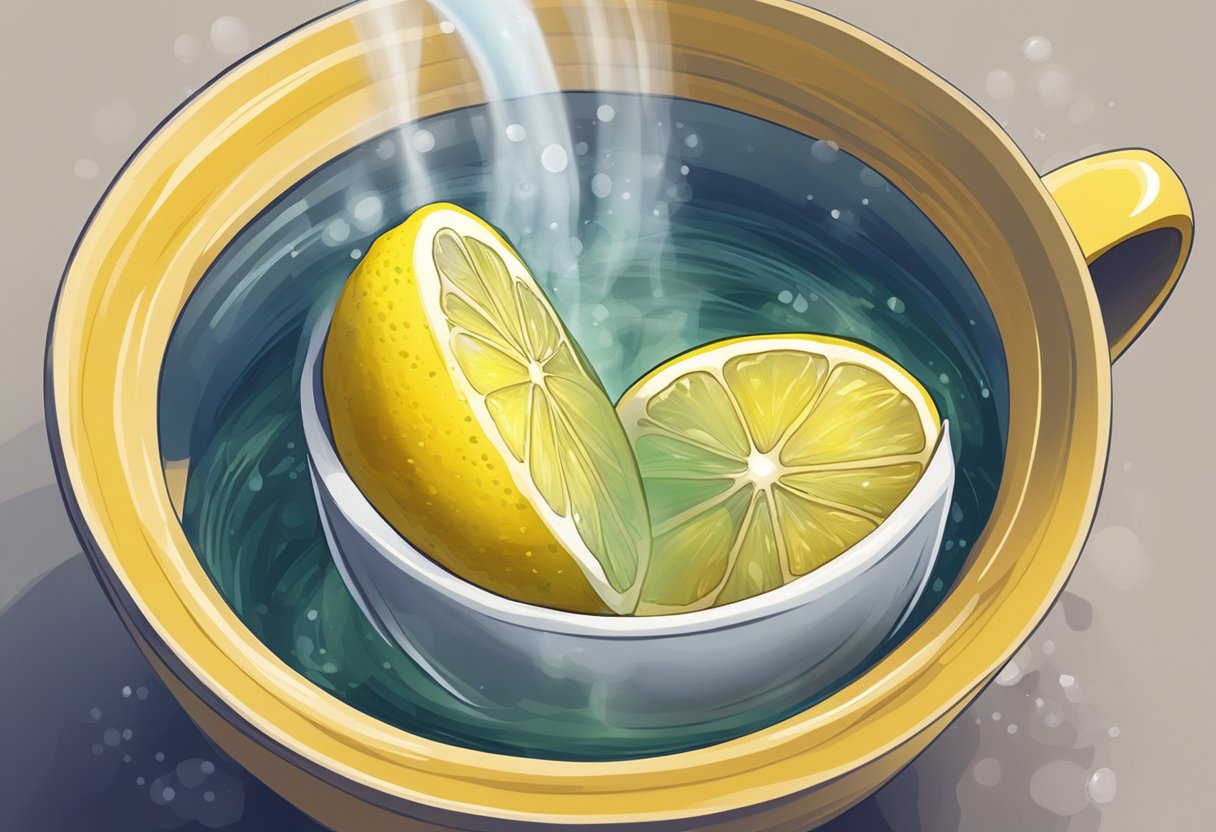
Warmth can soothe sore throat discomfort by promoting blood flow and providing a comforting sensation that can mitigate pain signals.
How Warmth Can Alleviate Throat Pain
- Warmth dilates blood vessels: This helps to increase blood flow to the throat, which can facilitate healing and reduce pain.
- Relaxation of throat muscles: The heat can help relax the muscles around the throat, lessening the discomfort.
| Method | Description |
|---|---|
| Steam inhalation | Breathing in warm, moist air through steam can hydrate the throat lining and loose mucus. |
| Warm water gargle | Gargling with warm water can provide immediate relief by warming the throat and washing away irritants. |
Natural Anti-inflammatory Remedies
Natural remedies may offer anti-inflammatory effects that help reduce sore throat pain and irritation.
- Anti-inflammatory properties: Natural substances like lemon contain compounds that can reduce inflammation and offer relief.
- Honey coating: Honey can coat the throat and has natural antibacterial properties, potentially reducing swelling and discomfort.
| Remedy | Benefits |
|---|---|
| Lemon | Vitamins, soothing effects |
| Honey | Coating, antimicrobial |
Warm drinks often combine anti-inflammatory substances, such as honey and lemon, with hot water, creating a soothing natural remedy for a sore throat.
Is Spicy Good for Sore Throat Remedies?
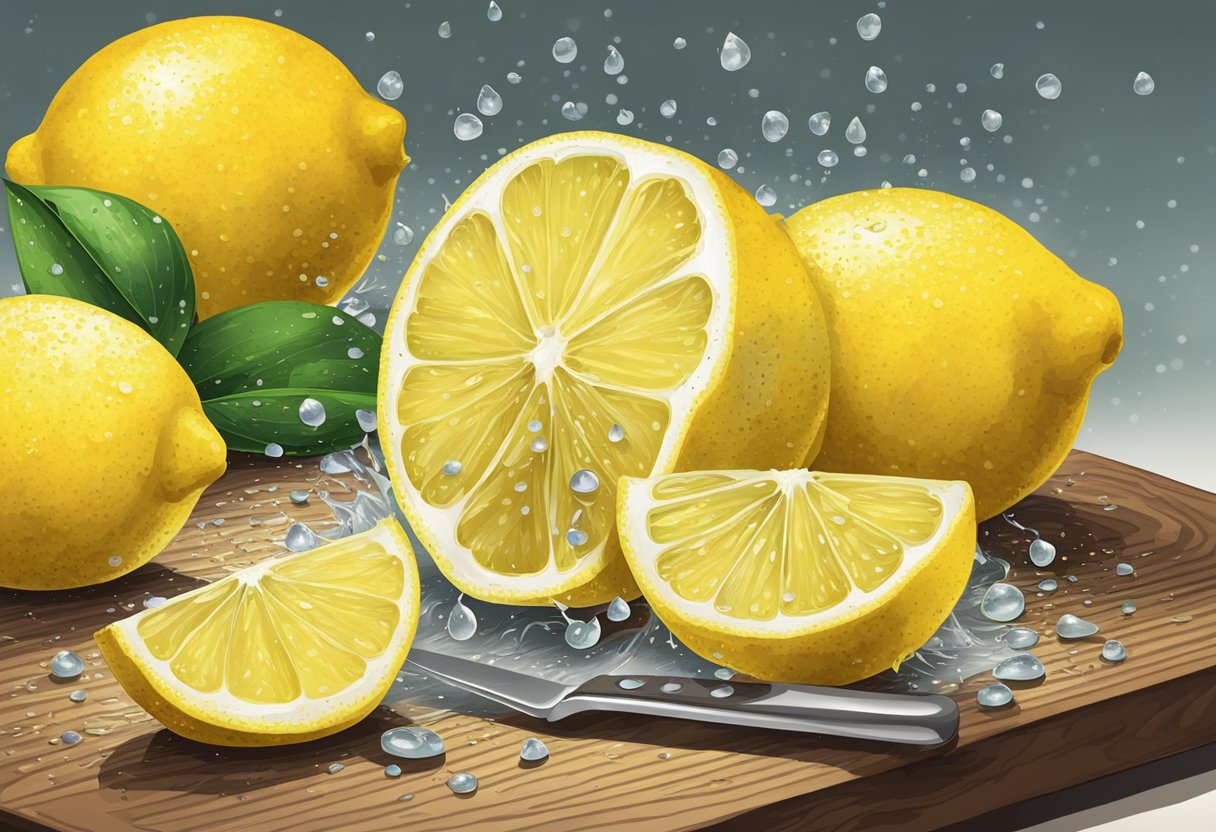
In the pursuit of alleviating throat pain, spicy ingredients like cayenne pepper have been considered for their therapeutic effects.
Can Cayenne Pepper Alleviate Throat Pain?
It can, when used in moderation. Cayenne pepper contains capsaicin, which is known for its pain-relieving properties. Here’s how cayenne pepper might affect throat pain:
- Capsaicin: The active component has analgesic properties, potentially numbing throat pain.
- Dosage: A small amount mixed with warm water and honey can create a gargling solution.
| Concentration of Cayenne Pepper | Proposed Benefit |
|---|---|
| Low | May help numb the throat pain |
| Moderate | Increases circulation to the area |
Does Hot Sauce Combat Inflammation in Sore Throats?
Yes, hot sauce can help fight inflammation due to the capsaicin it contains. When considering hot sauce as a remedy, one should note the following:
- Anti-inflammatory: The compounds in hot sauce can reduce inflammation which may soothe a sore throat.
| Ingredient in Hot Sauce | Anti-inflammatory Potential |
|---|---|
| Capsaicin | Can help reduce inflammation |
| Vinegar | May have antimicrobial properties |
- Use with Caution: An excess can irritate the throat. Start with a very small amount.
Remember, while some find spicy remedies effective, they are not suitable for everyone, especially children or those with sensitive throats.
When Should You See a Doctor?

Seeing a doctor for a sore throat is advisable if symptoms persist for more than a week, significantly worsen, or are accompanied by other concerning symptoms.
Persistent Symptoms and Medical Advice
If their sore throat lasts more than one week, individuals should consider seeking medical advice. Persistent symptoms may indicate a more serious condition requiring professional assessment. Symptoms to monitor include:
- Throat: An ongoing scratchy or painful throat.
- Voice: Hoarseness or voice changes lasting more than two weeks.
These are signs that the sore throat may not be a simple viral infection and might need medical intervention.
Signs of Complicated Bacterial Infections
One should be vigilant for symptoms that could signify a complicated bacterial infection. If any of the following symptoms are present, one must see a doctor:
| Symptom | Description |
|---|---|
| High fever | A fever higher than 101°F (38.3°C) indicating possible bacterial involvement. |
| Difficulty swallowing | Trouble swallowing or breathing; it could signal significant throat swelling. |
| Other symptoms | Tender lymph nodes, rash, or the presence of white patches on the tonsils. |
These symptoms can indicate bacterial infections such as strep throat, which may require antibiotics for treatment.
Frequently Asked Questions
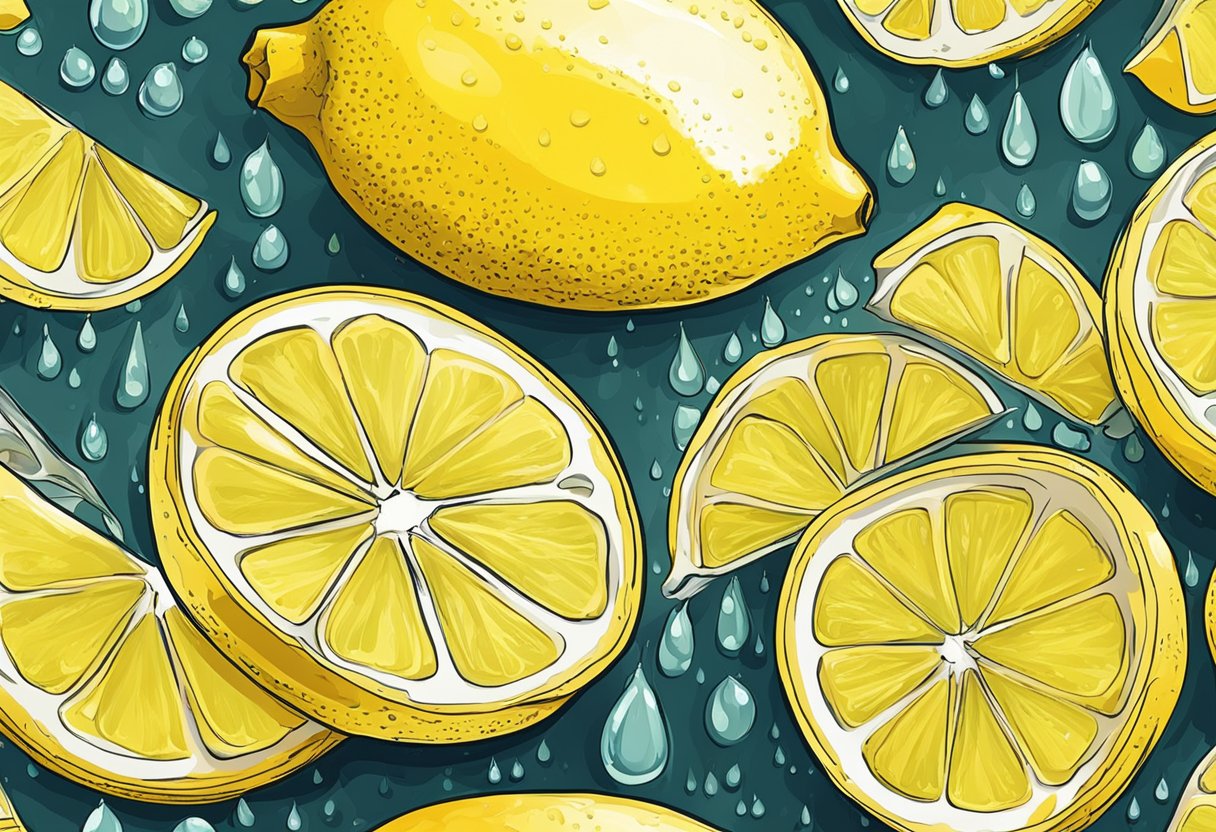
This section addresses common inquiries regarding the use of lemon for sore throat relief and related home remedies.
What are the fastest ways to alleviate a sore throat overnight?
Staying hydrated and humidifying the air can quickly ease sore throat discomfort. Additional remedies include:
- Gargling with warm saltwater.
- Drinking warm teas.
- Sucking on throat lozenges or ice chips.
How can lemon be used to help relieve a sore throat?
Lemon can be used in warm drinks or mixtures to help soothe a sore throat. It’s typically administered in the following ways:
- Added to warm water or herbal tea.
- Mixed with honey in warm water.
Are there any benefits to using lemon for cough and sore throat relief?
Lemon provides vitamin C and can help to thin mucus, which may relieve cough and sore throat. Its properties include:
| Properties | Benefits |
|---|---|
| Vitamin C | Boosts the immune system |
| Acidity | Helps to break down mucus |
Can a combination of lemon and honey be effective for treating sore throats?
A mixture of lemon and honey can be very effective for treating sore throats. They offer:
- Honey’s natural antibacterial effects.
- Lemon’s ability to provide a soothing coating.
What throat-comforting benefits does lemonade offer for sore throat symptoms?
Lemonade can help to keep the throat moist and reduce discomfort. It is important that it is:
- Not too cold, as very cold drinks can aggravate a sore throat.
- Not too acidic; dilute with water if necessary.
Are there any rapid remedies for curing a sore throat quickly?
Warm liquids and throat lozenges can provide rapid relief for sore throat symptoms. Besides these methods, individuals may seek:
- Over-the-counter pain relievers.
- Adequate rest to support the immune system.
